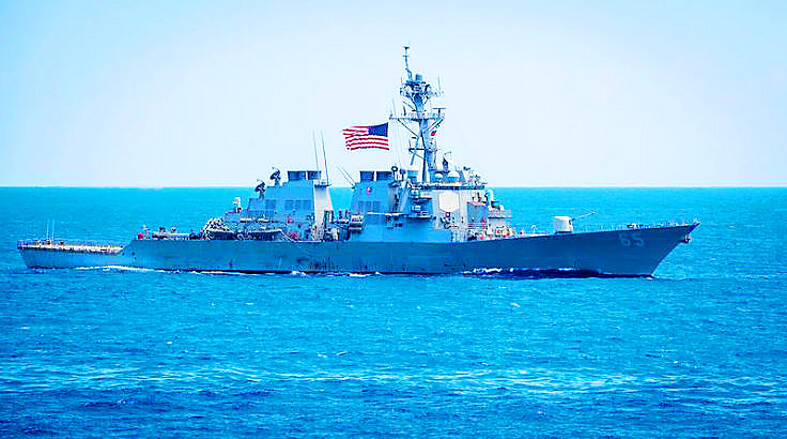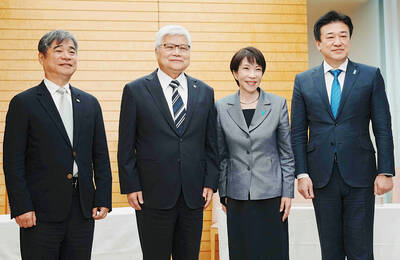More than half of Americans believe that the US should defend Taiwan in the event of a Chinese invasion, a survey commissioned by Newsweek found.
Of the respondents, 31 percent said they would approve and 25 percent said they would strongly approve of the US’ involvement in a cross-strait crisis, Newsweek reported on Friday.
The percentage increased to 56 percent from 47 percent in the middle of August last year, it said, adding that those who were against the US intervening remained the same at 12 percent.

Photo: Reuters
Half of the respondents believed the US was “committed by treaty” to defend Taiwan from a Chinese invasion, Newsweek reported.
The treaty refers to the US’ Taiwan Relations Act.
The survey collected 1,500 valid responses from eligible voters, and was conducted on April 4, the day before President Tsai Ing-wen (蔡英文) met with US House of Representatives Speaker Kevin McCarthy in California, Newsweek said.
The poll reflected that Taiwan was more frequently mentioned by political leaders in the US, said political scientist Raymond Kuo (郭泓均), director of RAND Corp’s Hu Taiwan Policy Initiative.
“There’s always been a latent amount of public support for Taiwan,” Newsweek quoted Kuo as saying.
Americans, regardless of political affiliation, are becoming more familiar with and concerned about Taiwan issues, he added.
However, one-third of the respondents said that they did not know whether Taiwan was a military ally of the US, indicating that “the semantic subtleties of US policy towards Taiwan are often lost,” Newsweek said.
Kharis Templeman, a research fellow at Stanford University’s Hoover Institution and program manager of the Hoover Project on Taiwan in the Indo-Pacific Region, was quoted as saying that the US should articulate its position on Taiwan.
Washington “views Taiwan’s international status as undecided, and that a final determination requires a peaceful and voluntary agreement from both sides of the strait,” Templeman said.
Although the US has made no official commitment to defend Taiwan, it has “a long-standing interest in seeing a peaceful resolution of differences across the strait,” he said.
Americans tend to take an unfavorable view of China and distrust Chinese President Xi Jinping (習近平), a sentiment that has grown in recent years, Newsweek said.
Forty-one percent of the poll’s respondents said China was “the greatest threat” to US interests, followed by Russia with 35 percent, North Korea with 7 percent and Iran with 3 percent, it said.
In other news, experts on Taiwan-US relations said in a new book published on Saturday titled US-Taiwan Relations: Will China’s Challenge Lead to a Crisis? that a cross-strait conflict is not inevitable.
Authors of the book include Ryan Hass, a senior fellow at the Brookings Institution, Bonnie Glaser, managing director of the German Marshall Fund of the US’ Indo-Pacific program, and former American Institute in Taiwan chairman Richard Bush.
The book discusses the US’ most effective responses to tackle China’s growing military threats against Taiwan, Amazon.com says.
The authors say that the US’ Taiwan policies should focus on understanding the hopes and fears of Taiwanese regarding the threats posed by China.
Maintaining a credible military deterrence is the minimum threshold, they said, adding that the US should fortify Taiwan’s economic dynamism, political autonomy, military preparedness, and dignity and respect on the world stage.

Right-wing political scientist Laura Fernandez on Sunday won Costa Rica’s presidential election by a landslide, after promising to crack down on rising violence linked to the cocaine trade. Fernandez’s nearest rival, economist Alvaro Ramos, conceded defeat as results showed the ruling party far exceeding the threshold of 40 percent needed to avoid a runoff. With 94 percent of polling stations counted, the political heir of outgoing Costa Rican President Rodrigo Chaves had captured 48.3 percent of the vote compared with Ramos’ 33.4 percent, the Supreme Electoral Tribunal said. As soon as the first results were announced, members of Fernandez’s Sovereign People’s Party

EMERGING FIELDS: The Chinese president said that the two countries would explore cooperation in green technology, the digital economy and artificial intelligence Chinese President Xi Jinping (習近平) yesterday called for an “equal and orderly multipolar world” in the face of “unilateral bullying,” in an apparent jab at the US. Xi was speaking during talks in Beijing with Uruguayan President Yamandu Orsi, the first South American leader to visit China since US special forces captured then-Venezuelan president Nicolas Maduro last month — an operation that Beijing condemned as a violation of sovereignty. Orsi follows a slew of leaders to have visited China seeking to boost ties with the world’s second-largest economy to hedge against US President Donald Trump’s increasingly unpredictable administration. “The international situation is fraught

Taiwan Semiconductor Manufacturing Co (TSMC, 台積電) plans to make advanced 3-nanometer chips in Japan, stepping up its semiconductor manufacturing roadmap in the country in a triumph for Japanese Prime Minister Sanae Takaichi’s technology ambitions. TSMC is to adopt cutting-edge technology for its second wafer fab in Kumamoto, company chairman C.C. Wei (魏哲家) said yesterday. That is an upgrade from an original blueprint to produce 7-nanometer chips by late next year, people familiar with the matter said. TSMC began mass production at its first plant in Japan’s Kumamoto in late 2024. Its second fab, which is still under construction, was originally focused on

GROWING AMBITIONS: The scale and tempo of the operations show that the Strait has become the core theater for China to expand its security interests, the report said Chinese military aircraft incursions around Taiwan have surged nearly 15-fold over the past five years, according to a report released yesterday by the Democratic Progressive Party’s (DPP) Department of China Affairs. Sorties in the Taiwan Strait were previously irregular, totaling 380 in 2020, but have since evolved into routine operations, the report showed. “This demonstrates that the Taiwan Strait has become both the starting point and testing ground for Beijing’s expansionist ambitions,” it said. Driven by military expansionism, China is systematically pursuing actions aimed at altering the regional “status quo,” the department said, adding that Taiwan represents the most critical link in China’s